
The Bastidon Pradon
Starting from Oppède-le-Vieux and its rocky outcrop, the route quickly climbs to the summit plateau of the Petit Luberon (705m), penetrates a short time under the great cedars to unveil the cabin in Bastidon du Pradon then plunges to the north side by a succession of bare mountains between scrubland and rock. Wide open vistas of the Calavon valley, the Monts-de-Vaucluse and the Ventoux further. The final descent, steep and wild finishes under the cedars and returns to the village by an old cobblestone road.
11 points of interest
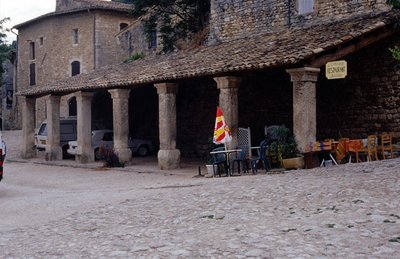
Halle d'Oppède-le-Vieux - ©PNR Luberon  Patrimony and history
Patrimony and historyThe covered market
As evidenced by the inscription in one of the stone pillars, this covered market was built in 1772. Located at Place de la Croix and against the rampart, it hosted the meetings of the villagers including fairs. Simple, with an elongated lean-to roof, the care and precision brought to moulded capitals of the pillars is quite noticeable. It was restored in 1991 while missing three spans.
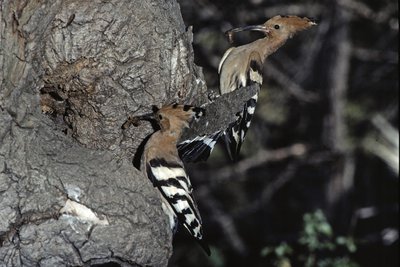
Huppes fasciées près de leur nid - Claude Tardieu  Fauna
FaunaOld forests and tree sheds
Here the atmosphere is special, and the ecological wealth is striking. A true social housing moss and fungi, older trees host a multitude of inhabitants; birds, insects, or bats ... In the cracks of branches, holes drilled by woodpeckers or under the ivy, they nest or flush out wood-eating insects (xylophagous). The flora of the understory is also original. These old forests are precious.
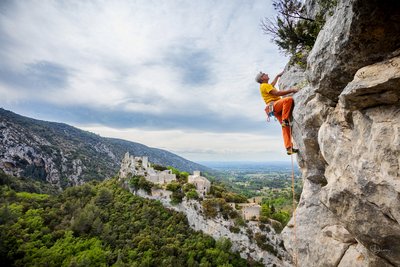
Escalade sur le secteur Dent du Loup - ©Pierre Duret  Patrimony and history
Patrimony and historyHere, it's all about climbing!
To the right, above the path, lies a small rock climbing schoolpopular with climbers from all around the country. Itcontains about forty routes with difficulty levels ranging from 3a to 7b, fitted on limestone slabs over 16m. Located at the limit of the biotope protection, it is the only site open to climbers on the Petit Luberon. All the other cliffs are closed to climbing practices in order to preserve the tranquillity of raptors.
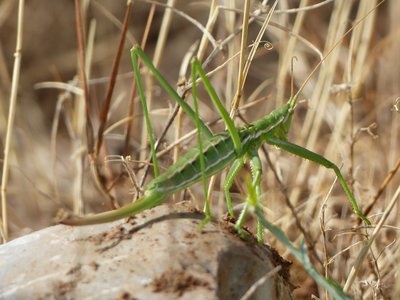
Magicienne dentelée - ©Laurent Michel - PNR Luberon  Fauna
FaunaThe Spiked Magician
The Spiked magician (Saga pedo) is the largest bush cricket in France and among the largest insects. It may indeed measure up to 11cm. Very discreet, it enjoys the dry grassland and scrubland of southern France that we see here. Rather a rare fact, there is no male of this species. The females reproduce with parthenogenesis (asexual reproduction) and the offsprings of each female are therefore clones.

Petit refuge du Bastidon du Pradon - ©DR - refuges.info  Patrimony and history
Patrimony and historyThe Bastidon Pradon
The small unguarded hut you will see is called "Bastidon Pradon". Open to hikers or passing riders, it is freely available. Inside, no mattresses or blankets but enough dishes to eat and warm up. Perfect for a break or a step, the days of big mistral!
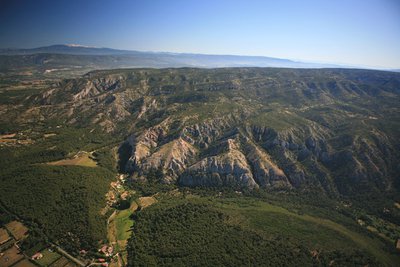
Vue sur l'extrémité du Petit Luberon - ©Christian Kelma  Geology
GeologyA tropical sea
The summit plateau of the Petit Luberon consists of limestone that formed in the seabed, about 130 million years ago. At that time, France and especially Provence were further south. The climate was therefore warmer than today and the seabed populated by corals, rudist (bivalve molluscs disappeared there 66 million years ago), sea urchins, snails ...

Grande Ephèdre en fruits - ©Régis Gaudin - ONF  Flora
FloraArchaic Ephedra Major
In this limestone habitat develops the Ephedra Major, a bush origin to the vegetation of the town’s Mediterranean hills. This twigged plant, completely covered by layers of long, thin leaves, is one of the oldest plants alive today. Favoring extreme conditions related to the mistral in particular, it is confined to the western end of the Massif du Luberon. You may notice bright red ripe fruit from August to September.

Pelouse des crêtes - ©Eric Garnier - PNR Luberon  Flora
FloraExceptional lawns on the ridges
From the traditional practice of grazing and constraints combined with Mediterranean and Alpine climates, lawns are home to many of the Luberon heritage species of plants and insects. They are also hunting areas for large raptors. With sheep grazing in spring, combined with bush clearing, shrubs continue to grow. Scientific monitoring of rare and sensitive species are conducted on several sites.

Lézard ocellé - ©DR-G. Deso  Fauna
FaunaThe Ocellated Lizard
The Ocellated lizard is the largest lizard in Europe, individuals may reach 90 cm including the tail. It is easily recognized by its large triangular head, his yellow-green hue and circles or "eyespots" bright blue on its sides. It appreciates the open areas and dry soils such as rocky scrubland. This lizard feeds on large insects, spiders and small rodents. It is now under threat because of the loss of open areas.

Vautour percnoptère - ©David Tatin  Fauna
FaunaThe iconic Egyptian Vulture
The Luberon is one of the safe havens for this rare and protected vulture. A true natural knacker, it is threatened by the decline of herds and the depletion of food resources. To ensure the survival of this species, the Luberon Park has placed the supply of several feeding stations and ensures close monitoring. Respecting the quiet of this area in the spring and summer will allow the Vulture to nest again in nearby cliffs.
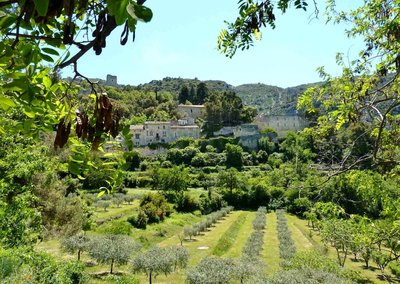
Terrasses de Sainte-Cécile - ©Destination Luberon  Flora
FloraThe landscaped garden of Sainte-Cécile
Take the time to visit to the north side of the village, the landscaped garden of Saint-Cécile's terraces.! These fifteen dry stone terraces gather more than forty species of trees and shrubs, typical of the country. Shaped like an amphitheatre, it is a real collection of the Luberon jewels over 1.6ha.
Description
From the Place de la Croix, go along the halls, keep walking and turn left on Rue de l'Ecole". Turn right and reach below the Chemin de la Fontaine (GR®). Take the road on the right.
1- At the crossroads "Poudarrigue'', continue the GR® to the right and climb the stony path. Reach a hillock (338m) and continue up to the right. After the several switchbacks, continue climbing the mount and finally reach the paved forest path.
2- Turn left and 20m further go to the right in the undergrowth (GR®). Reach the small mountain hut of Bastidon du Pradon 150m away. Retrace your steps to the point 2, turn left and take the forest track to the west (PR). 250m further, pass the crossroads "La Jassine" and continue straight, on the track. Let yourself slide over 1km.
3- At the crossroads "Les Aires de Bedoin'', turn right and follow the dirt and stone track. Continue on 400m on the plateau.
4- Be careful not to miss the path on the right (Cairn - turn around if you reach to the weather station!). Moving forward on the edge of the Barre de Fiot (markings hardly noticeable). After the Barre de Gautier, move to the right (point 601m), go 300m down and switch left into the valley. 500m further and 180m lower down, continue on the left flank of the valley, crossing several hairpin bends and come out on the trail in the foothills.
5- Turn right (GR®), descend some more then rise slightly to switch to the clearing of Combrès valley. After the vineyard, turn left at the crossroads "Combrès", then climb the old cobblestone path to the right that leads up some steps in the village of Oppède-le-Vieux.
- Departure : Place de la Croix, center of Oppède-le-Vieux
- Arrival : Place de la Croix, center of Oppède-le-Vieux
- Towns crossed : Oppède and Cheval-Blanc
Forecast
Altimetric profile
Recommandations
At the starting point, following a landslide, the original route of the GR ® in the streets of Oppède-le-Vieux was rerouted. It goes a bit down the street from the school and not by the old staircase located at the end of the Rue du Portalet (follow signs).
Be careful with your ankles on the limestone eroded areas (lapiaz) and descending the Barre de Gautier (between points 4 and 5).
Information desks
House of the Luberon Regional Nature Park
60, place Jean Jaurès, 84400 Apt
In the heart the old town centre of Apt, the House of the Luberon Regional Nature Park welcomes you in a town house of the 18th century. The permanent exhibition of the geology museum has a rich collection of fossils evidencing the geological history of the Luberon.
On sale at the shop: books, maps, guidebooks, games, posters...
Open Monday to Friday from 8:30 am to 12:00 pm and from 1:30 pm to 6 pm (and on Saturday, depending on the program). Free admission.
OTI Luberon Coeur de Provence
Place François Tourel, 84300 Cavaillon
Access and parking
At 11km / 7 miles east of Cavaillon, taking the D973, D2 and D29.
Parking :
Report a problem or an error
If you have found an error on this page or if you have noticed any problems during your hike, please report them to us here:


